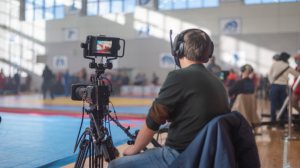Do you have a passion for sports and a way with words? If so, becoming a sports journalist might be the perfect career path for you. In this comprehensive guide, we will take you through the step-by-step process of how to become a sports journalist. First, we will define what exactly a sports journalist is and what they do. Then, we will discuss the qualifications needed to enter this exciting field. From honing your writing skills to obtaining training in journalism and specializing in sports reporting, we will cover all the necessary steps to get started. But it doesn’t stop there. We will also address the common challenges faced by sports journalists and highlight the benefits of pursuing this rewarding profession. So if you’re ready to combine your love for sports with your passion for storytelling, let’s dive into the world of sports journalism together.
What is a Sport Journalist?

A sports journalist is a professional who covers sporting events, athletes, and related news. They gather information through interviews, research, and attending games. Sports journalists write articles, produce broadcasts, or create multimedia content about sports, specializing in a particular sport or covering a range of sports based on their expertise and interests.
What Does a Sports Journalist Do?

Sports journalists play a vital role in covering sporting events and providing news and analysis. They conduct interviews with players, coaches, and other key individuals in the sports industry. Writing articles, reporting on live events, and creating multimedia content are also part of their responsibilities. Additionally, they analyze statistics, trends, and strategies related to sports.
The Qualifications Needed to Become a Sports Journalist

A sports journalist in the UK needs to have a good standard of education, preferably a degree in journalism or another relevant subject. They must also have excellent written and spoken English skills.
In terms of specific qualifications, the National Council for the Training of Journalists (NCTJ) offers several courses which would be beneficial for someone looking to become a sports journalist. The NCTJ offers a Level 3 Diploma in Journalism, as well as various short courses which cover specific aspects of journalism such as court reporting and shorthand speed typing.
Additionally, many employers will require journalists to have some experience in the field, whether that be through internships or work experience placements. Therefore, it is important to try and gain as much experience as possible whilst studying for your journalism qualification.
How to Become a Sports Journalist?

Becoming a sports journalist can be an exciting and rewarding career path for those who are passionate about both sports and journalism. Here are some steps to help you on your journey to becoming a sports journalist:
1. Honing Your Writing Skills
To become a successful sports journalist, it’s essential to hone your writing skills. Practice regularly and seek feedback from others to improve your craft. Study journalism and communication courses to understand the principles and ethics of the field. Gain experience by writing for school or local newspapers, starting a sports blog, or contributing to online publications. Build a portfolio showcasing your work and network with industry professionals for advice and mentorship. Stay updated on current sports news, trends, and social media to enhance your knowledge.
2. Obtaining Training in Journalism
To obtain the necessary training in journalism, start by pursuing a bachelor’s degree in journalism, communications, or a related field. Take courses that specifically focus on sports journalism to develop the essential skills and knowledge required for the profession. Consider gaining experience through internships or by working for local sports publications or media outlets. Build a strong portfolio that showcases your writing, reporting, and multimedia skills. Additionally, network with professionals in the industry and attend industry events to make connections and learn from experienced sports journalists.
3. Specializing in Sports Journalism
To become a sports journalist, it is essential to specialize in sports journalism during your education and training. Seek out journalism programs or courses that offer specific coursework or concentrations in sports journalism. Make the most of internships or work experience opportunities in sports media outlets like newspapers, magazines, or online publications. Create a portfolio by covering local sports events and producing articles or multimedia content about them. Expand your network by connecting with professionals in the sports journalism industry, attending industry events and conferences, and joining relevant professional organizations to increase your contacts and opportunities.
4. Landing a Sports Journalist Job
To land a sports journalist job, start by building a strong portfolio of sports writing samples that highlight your skills and knowledge. Network with industry professionals, attend relevant events, and join sports journalism organizations. Gain experience through internships or entry-level positions at sports media outlets. Stay informed about current sports events and trends. Continuously improve your writing, reporting, and interviewing skills by seeking feedback from experienced journalists.
Common Challenges Faced by Sports Journalists

Sports journalists face common challenges in their profession. One challenge is balancing objectivity and fandom, as they must report impartially while being passionate about certain teams or athletes. Another challenge is gaining access to players and coaches for interviews, especially in competitive sports industries.
Additionally, sports journalists often work under tight deadlines in a fast-paced environment, covering live events and breaking news. They may also face irregular hours and travel frequently to cover games and events across different time zones. Furthermore, with the advent of social media, sports journalists must navigate the challenge of verifying information quickly and preventing the spread of false rumors or misinformation.
What Are the Benefits of Being a Sport Journalist?

Being a sports journalist comes with many benefits. First and foremost, it allows you to combine your passion for sports with your love for writing and storytelling. You get to be right in the middle of all the action, covering exciting games and events, and sharing the stories of athletes and teams with the world. Being a sports journalist also provides opportunities for travel, as you may have the chance to cover major sporting events around the globe. Additionally, being a sports journalist can open doors to various career paths within the sports industry, such as broadcasting or public relations. Overall, being a sport journalist offers a unique and fulfilling career that allows you to immerse yourself in the world of sports while sharing your passion with others.
Conclusion
In conclusion, becoming a sports journalist requires a combination of skills, education, and experience. It’s important to hone your writing skills, obtain training in journalism, specialize in sports journalism, and actively seek job opportunities in the field. While there are challenges faced by sports journalists, such as tight deadlines and high-pressure situations, the benefits can be incredibly rewarding. You’ll have the opportunity to cover exciting events, meet athletes and coaches, and share stories that resonate with sports fans around the world. If you’re passionate about sports and storytelling, pursuing a career as a sports journalist may be the perfect fit for you. Start your journey today by honing your writing skills and exploring opportunities in sports journalism.









